新概念英语第二册:第8课课文详解及语法解析
新概念第二册Lesson88Trappedinamine课文详解重点词汇语法语法填空讲义(1)

Lesson 88 文本Trapped in a mineSix men have been trapped in a mine for seventeen hours. If they are not brought to the surface soon they may lose their lives. However, rescue operations are proving difficult. If explosives are used, vibrations will cause the roof of the mine to collapse. Rescue workers are therefore drilling a hole on the north side of the mine. They intend to bring the men up in a special capsule. If there had not been a hard layer of rock beneath the soil, they would have pleted the job in a few hours. As it is, they have been drilling for sixteen hours and they still have a long way to go. Meanwhile, a microphone, which was lowered into the mine two hours ago, has enabled the men to keep in touch with the closest relatives. Though they are running out of food and drink, the men are cheerful and confident that they will get out soon. They have been told that rescue operations are progressing smoothly. If they knew how difficult it was to drill through the hard rock, they would lose heart.文本解析一〕词汇学习Word study1. collapse vi.〔1〕倒塌:If explosives are used, vibrations will cause the roof of the mine to collapse.假设用炸药爆破,震惊会引起矿顶塌落。
新概念第二册Lesson80Thecrystalpalace课文详解重点词汇语法语法填空讲义
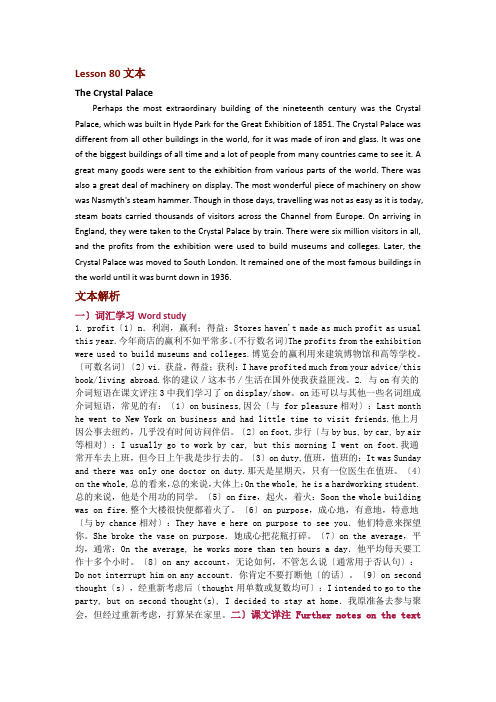
Lesson 80 文本The Crystal PalacePerhaps the most extraordinary building of the nineteenth century was the Crystal Palace, which was built in Hyde Park for the Great Exhibition of 1851. The Crystal Palace was different from all other buildings in the world, for it was made of iron and glass. It was one of the biggest buildings of all time and a lot of people from many countries came to see it. A great many goods were sent to the exhibition from various parts of the world. There was also a great deal of machinery on display. The most wonderful piece of machinery on show was Nasmyth's steam hammer. Though in those days, travelling was not as easy as it is today, steam boats carried thousands of visitors across the Channel from Europe. On arriving in England, they were taken to the Crystal Palace by train. There were six million visitors in all, and the profits from the exhibition were used to build museums and colleges. Later, the Crystal Palace was moved to South London. It remained one of the most famous buildings in the world until it was burnt down in 1936.文本解析一〕词汇学习Word study1. profit〔1〕n.利润,赢利;得益:Stores haven't made as much profit as usual〔不行数名词〕The profits from the exhibition this year.今年商店的赢利不如平常多。
新概念二册第8课详解
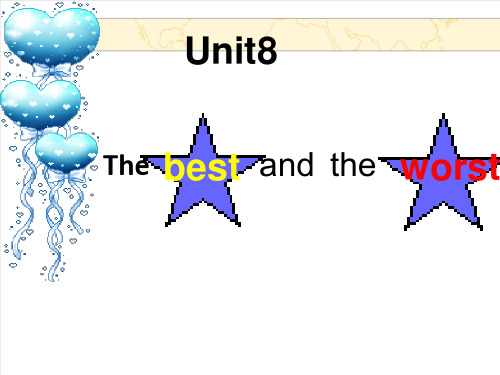
• How many students entered for the competition?
• win(won,won) v. 赢 • ① vi. 赢 I won. • ② vt. 赢得…… • win something 后面往往是奖品,
• Nearly everybody enters for 'The Nicest Garden Competition' each year, but Joe wins every time.
• nearly和almost意义相似,表示“几乎”、 “差不多”、“差点儿”
• I have nearly forgotten his name. • 我差点把他的名字忘了。 • 我快准备好了。
• 这件裙子是你自己做的吗?
• Have you made the skirt by yourself? • 而build主要限于建筑业,指“建造,建设,盖房子,
修筑(桥梁)等” • 他们沿着河修了条路。 • They have made a road along the river.
• I like gardens too, but I do not like hard work. Every year I enter for the garden competition too, and I always win a little prize for the worst garden in the town!
不能接对手 • 赢得了一个奖
• win a prize • beat+sb • Tom beat peter.
新概念英语第二册 Lesson 8

1) 一般在词尾加er或est
2) 以字母e结尾的词,加r 或st
单音节 词和少 数多音 节词
3) 重读闭音节词以一个元 音字母和一个辅音字母结 尾,先双写辅音字母;再 加er或est
4) 以“辅音字母+y”结尾的 双音节词,先改“y”为 “i”,再加er或est
cold fast nice large big hot easy early tired
make和build在这里是同义词,“修建,建造”。 make的词义比较笼统、广泛,可解释为“做、作出、制造”等 Have you made the skirt by yourself? They have made a road along the river. build主要限于建筑业,指“建造,建设,盖房子,修筑(桥梁)等”
Review
几个小时之前 拿出来 充满 期待某人做... 贵重的礼物 珍贵的礼物 装有钻石的包裹 令某人惊讶的是...
2018/5/8
a few hours earlier take off be full of expect sb to do sth a valuable present a precious present a parcel of diamonds to one's surprise
funny
funnier
the funniest
Geyou is funny. Zhao Benshan is funnier than Geyou (is). Pan Changjiang is the funniest of them .
1) 规则变化
1. 形容词和副词• • • • • • • • • •
• • • •
新概念英语第二册课文详解

新概念英语第二册课文详解新概念英语第二册课文详解课文详注一FurthernotesonthetextstweekIwenttothetheatre.上星期我去看戏。
(1)句首的“Lastweek”点明叙述的事情发生的时间是上星期。
因此整篇课文的时态基本上应是过去时(包括过去进行时),直接引语部分的时态除外。
(2)动词go的原义是离开一个地方去另一个地方,与介词to连用后,常加上主语所要去的目的地来代表主语的动作目的。
课文中gotothetheatre=gotothetheatretoseeaplay,即去剧场看戏。
类似的还有gotothecinema=gotothecinematoseeafilm(去电影院看电影)。
这种表达方式简明扼要。
请注意在以下的短语中名词前通常不加冠词:gotoschool上学gotobed上床睡觉gotochurch上教堂,去做礼拜(cf.第1册第68课atschool,atchurch;第1册第85课havebeentoschool/church)2.hadaverygoodseat座位很好seat一般指戏院、汽车等配置的固定座位,也可以抽象地表示“座位”或“位子”的概念:thefrontseatofacar汽车的前座Takeaseat,please.请坐。
3.Theplaywasveryinteresting.戏很有意思。
interesting属于现在分词形式的形容词,意思是“使人感兴趣”。
它通常与非人称主语连用或修饰某个事物:Thisisaninterestingbook/idea.这是一本有趣的书/一个令人感兴趣的主意。
4.…weresittingbehindme.Theyweretalkingloudly.……坐在我的身后,大声地说着话。
这两句的时态为过去进行时。
(cf.第7课语法)5.Igotveryangry.我变得非常生气。
get在这里有“逐渐变得”的含义,接近become,是个表示过程的动词,表示状态的变化。
新概念英语第二册:第84课课文详解及语法解析
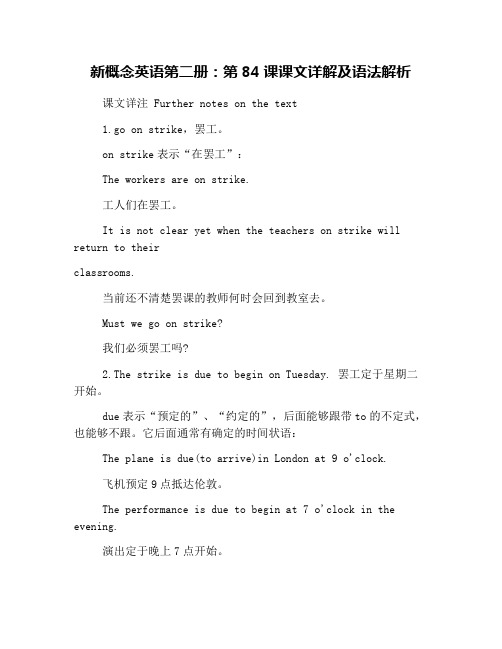
新概念英语第二册:第84课课文详解及语法解析课文详注 Further notes on the text1.go on strike,罢工。
on strike表示“在罢工”:The workers are on strike.工人们在罢工。
It is not clear yet when the teachers on strike will return to theirclassrooms.当前还不清楚罢课的教师何时会回到教室去。
Must we go on strike?我们必须罢工吗?2.The strike is due to begin on Tuesday. 罢工定于星期二开始。
due表示“预定的”、“约定的”,后面能够跟带to的不定式,也能够不跟。
它后面通常有确定的时间状语:The plane is due(to arrive)in London at 9 o'clock.飞机预定9点抵达伦敦。
The performance is due to begin at 7 o'clock in the evening.演出定于晚上7点开始。
due to后面若是名词,则它表示“因为”、“因为”(通常用于系动词be之后):Our delay was due to the heavy traffic.我们被耽搁了是因为交通拥挤。
3.…the strike will continue until general agreement is reached about payand working conditions.……此次罢工将一直持续到就工资和工作条件问题达成全面协议的时候为止。
在until引导的时间状语从句中,主语agreement的定语about pay and workingconditions被谓语隔开了。
因为谓语很短,如果定语紧跟agreement,则句子读起来会头重脚轻。
新概念英语第二册第八课笔记整理

新概念英语第二册第八课笔记整理摘要:I.引言- 介绍新概念英语第二册第八课的内容II.课文概述- 描述课文的主要内容- 介绍课文中的新单词和短语III.重点语法解析- 讲解课文中出现的重点语法- 给出例句帮助理解IV.学习技巧与方法- 分享学习英语的有效方法- 介绍如何提高英语听说读写能力V.总结- 总结本课的重要知识点- 鼓励读者多加练习,提高英语水平正文:新概念英语第二册第八课笔记整理新概念英语第二册第八课主要讲述了一个人在机场等待朋友的过程中,发生的一系列误会。
通过课文的学习,我们可以了解到机场的常用英语表达,以及如何用英语描述等待、期盼的心情。
同时,课文中也出现了一些重点语法,如一般现在时、现在进行时和一般过去时等。
课文概述:故事发生在一个机场,主要角色有一个人(A)和他的朋友(B)。
A在机场等待B,但B因为航班延误而迟迟未到。
A在等待过程中遇到了一些困难,如行李丢失、钱包被盗等。
最后,A和B终于见面,一起离开了机场。
重点单词和短语:1.airport(机场)2.terminal(候机厅)3.luggage(行李)4.wallet(钱包)5.delay(延误)6.customs(海关)7.boarding pass(登机牌)重点语法解析:1.一般现在时:用于描述事实、习惯或普遍真理。
例如:I usually wait for my friend at the airport.(我通常在机场等我的朋友。
)2.现在进行时:表示目前正在进行的动作。
例如:I am waiting for my friend.(我正在等我的朋友。
)3.一般过去时:表示过去某个特定时间发生的动作。
例如:I waited for my friend at the airport yesterday.(昨天我在机场等我的朋友。
)学习技巧与方法:1.多听、多说、多读、多写:提高英语能力的关键是多加练习。
可以尝试用英语描述日常生活中发生的事情,从而提高英语口语和写作能力。
新概念第二册Lesson81Escape课文详解重点词汇语法语法填空讲义

Lesson 81 文本EscapeWhen he had killed the guard, the prisoner of war quickly dragged him into the bushes. Working rapidly in the darkness, he soon changed into the dead man's clothes. Now, dressed in a blue uniform and with a rifle over his shoulder, the prisoner marched boldly up and down in front of the camp. He could hear shouting in the camp itself. Lights were blazing and men were running here and there: they had just discovered that a prisoner had escaped. At that moment, a large black car with four officers inside it, stopped at the camp gates. The officers got out and the prisoner stood to attention and saluted as they passed. When they had gone, the driver of the car came towards him. The man obviously wanted to talk. He was rather elderly with grey hair and clear blue eyes. The prisoner felt sorry for him, but there was nothing else he could do. As the man came near, the prisoner knocked him to the ground with a sharp blow. Then, jumping into the car, he drove off as quickly as he could.文本解析一〕词汇学习Word study1. cloth, clothes与clothing〔1〕cloth 通常指“布〞、“布料〞,为不行数名词:There's enough cloth for a skirt.那布料够做一条裙子。
新概念英语_第二册_第8课_课件

like gardens too, but I do not like hard work
too ,either, also , as well表示“也”的区别 too 肯末也 either 否末也 also 句中 as well = too
Key structure 关键句型 形容词比较级与最高级
• 2. enter for 报名参加(各种竞赛,考试等活动) • enter for the exam enter v. ①进入 Eg: enter the room • entrance n. 入口 • ② vt.&vi. 参加,加入 • We’ve entered into an agreement. • 我们已达成一项协议。 • He soon entered their conversation. • enter for 相当于take part in ,而join 是“参 加”某个组织。如:join the army
compete [kəm'pi:t] compete against sb..
• Compete only with yourself. • 只与自己竞争
compete with sb.
neat [ni:t]
adj. 整齐的, 整洁的,井井有条
neat freak 如洁癖 ; 有洁癖的人 ; 洁癖 neat profit 纯利 ; 纯利润 ; 净利 She endeavours to keep things neat in her apartment. 她力图把她房间里的一切东西保持整洁。
•
形容词比较级
• 1. 二者比,标志than • 2.比较级+and+比较级,或者, more and more 表示“越来越…” • 3.the+比较级, the+比较级 “越…越…” • 你吃的越多,你越胖。 • The more you eat , the fatter you will be. • 4. much, a little, far用来修饰形容词比较级, 且放于形容词之前。
新概念英语第二册课文知识点详解

NEW CONCEPT ENGLISH BOOK 2practice : 训练, progress : 进步If you practice more, then you can make great progress.五项综合训练技能listening : 听力speaking : 说话grammar : 语法writing : 写作reading : 阅读translation : 译knowledge +skillsLesson 1 A private conversation【New words and expressions】(12)private adj. 私人的conversation n. 谈话theatre n. 剧场,戏院seat n. 座位play n. 戏loudly adv. 大声地angry adj. 生气的angrily adv. 生气地attention n. 注意bear v. 容忍business n. 事rudely adv. 无礼地,粗鲁地★private adj.私人的★ adj. 私人的private life 私生活private school 私立学校It's my private letter. (如果妈妈想看你的信)It's my private house. (如果陌生人想进你的房子)★ adj. 普通的private citizen 普通公民I’m a private citizen. (citizen n. 公民)private soldier 大兵《Private Ryan》(《拯救大兵瑞恩》)public adj. 公众的,公开的(private的反义词)public school 公立学校public letter 公开信public place 公共场所privacy n.隐私It’s privacy. 这是我的隐私!(不愿让别人知道的)★conversation n.谈话have a + talk/chat/dialogue/conversation/gossip 名词变动词conversation 一般用于正式文体中, 内容上往往不正式subject of conversation 话题They are having a conversation.talk 内容可正式可不正式, 也可以私人Let’s have a talk.dialogue 对话, 可以指正式国家与国家会谈China and Korea are having a dialogue.chat 闲聊,就是北京人说的“侃”,说的是无关紧要的事。
新概念英语第二册第8课课文详解及语法解析
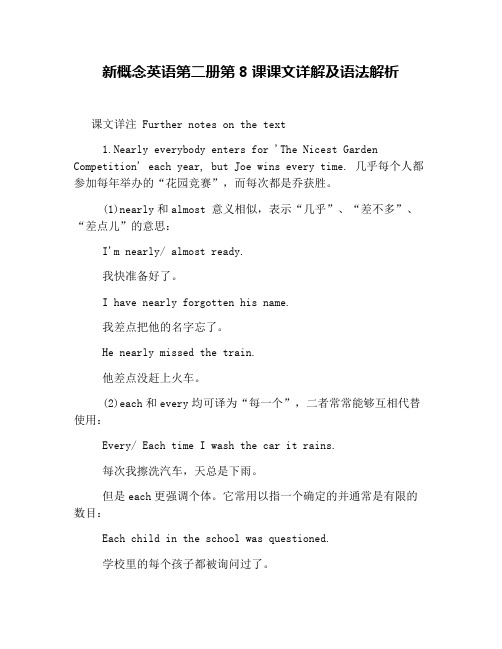
新概念英语第二册第8课课文详解及语法解析课文详注 Further notes on the text1.Nearly everybody enters for 'The Nicest Garden Competition' each year, but Joe wins every time. 几乎每个人都参加每年举办的“花园竞赛”,而每次都是乔获胜。
(1)nearly和almost 意义相似,表示“几乎”、“差不多”、“差点儿”的意思:I'm nearly/ almost ready.我快准备好了。
I have nearly forgotten his name.我差点把他的名字忘了。
He nearly missed the train.他差点没赶上火车。
(2)each和every均可译为“每一个”,二者常常能够互相代替使用:Every/ Each time I wash the car it rains.每次我擦洗汽车,天总是下雨。
但是each更强调个体。
它常用以指一个确定的并通常是有限的数目:Each child in the school was questioned.学校里的每个孩子都被询问过了。
every却不那么强调个体,常用来指一个大的、不确定的数目:Every child enjoys Christmas.所有的/每个孩子都喜欢过圣诞节。
另外,each既能够作形容词又能够作代词,但every只能作形容词:They each have a share.他们每人都有一份。
Each of us has his own work to do.我们每个人都有自己的工作要干。
2.Bill Frith's garden is larger than Joe's. 比尔·弗里斯的花园比乔的花园大。
名词加-'s表示所属关系,构成名词的所有格。
新概念英语第二册:第9课课文详解及语法解析

新概念英语第二册:第9课课文详解及语法解析课文详注 Further notes on the text1.…a large crowd of people had gathered under the Town Hall clock.……一大群人聚集在市政厅的大钟下面。
had gathered为过去完成时,表示过去某个时刻之前已经完成的动作。
(第14课语法) 2.It would strike twelve in twenty minutes' time.再过20分钟,大钟将敲响12下。
(1)这句话的时态为过去将来时。
(2)in+表示时间长度的短语可译为“……时间之后”,一般与将来时连用:Please wait a moment here. Jack will be back in a few minutes.请在此稍候。
杰克几分钟之后就回来。
(3)strike的基本含义是“打”、“击”:She struck the man in the face.她打了那人的脸。
当用于钟、乐器等东西时,它有“敲”、“弹”的含义:When I entered the room, the clock struck five.我进屋时,钟敲响了5点。
3.We waited and waited, but nothing happened.我们等啊等啊,可情况没有变化。
动词 happen作“发生”、“出现”讲时,主语是物:Have you heard what happened to Sam this morning?你听说今天上午萨姆发生了什么事了吗?An interesting thing happened last night.昨晚发生了一件有趣的事。
4.The big clock refused to welcome the New Year.那座大钟不愿意迎接新年。
这句话中的两个动词 refuse和welcome在一般情况下主语都是人。
新概念英语第二册课后习题答案详解_1-10
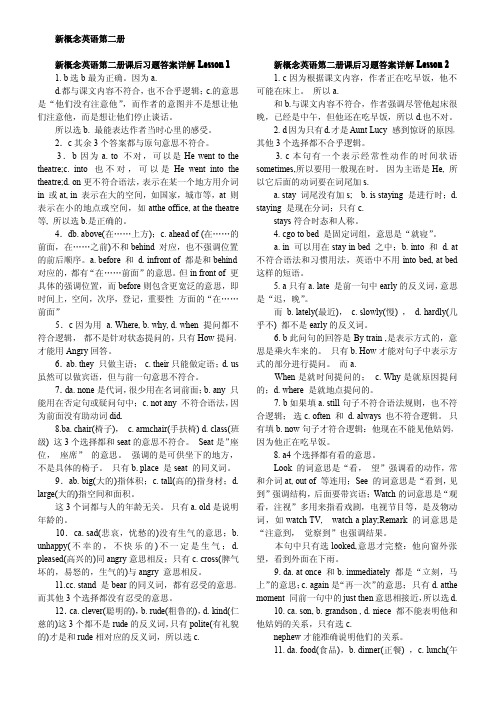
新概念英语第二册新概念英语第二册课后习题答案详解Lesson11.b选b最为正确。
因为a.d.都与课文内容不符合,也不合乎逻辑;c.的意思是“他们没有注意他”,而作者的意图并不是想让他们注意他,而是想让他们停止谈话。
所以选b.最能表达作者当时心里的感受。
2.c其余3个答案都与原句意思不符合。
3.b因为a.to不对,可以是He went to the theatre;c.into也不对,可以是He went into the theatre;d.on更不符合语法,表示在某一个地方用介词in或at,in表示在大的空间,如国家,城市等,at则表示在小的地点或空间,如atthe office,at the theatre 等,所以选b.是正确的。
4.db.above(在……上方);c.ahead of(在……的前面,在……之前)不和behind对应,也不强调位置的前后顺序。
a.before和 d.infront of都是和behind 对应的,都有“在……前面”的意思。
但in front of更具体的强调位置,而before则包含更宽泛的意思,即时间上,空间,次序,登记,重要性方面的“在……前面”5.c因为用 a.Where,b.why,d.when提问都不符合逻辑,都不是针对状态提问的,只有How提问,才能用Angry回答。
6.ab.they只做主语;c.their只能做定语; 虽然可以做宾语,但与前一句意思不符合。
7.da.none是代词,很少用在名词前面;b.any只能用在否定句或疑问句中;c.not any不符合语法,因为前面没有助动词did.8.ba.chair(椅子),c.armchair(手扶椅)d.class(班级)这3个选择都和seat的意思不符合。
Seat是”座位,座席”的意思。
强调的是可供坐下的地方,不是具体的椅子。
只有b.place是seat的同义词。
9.ab.big(大的)指体积;c.tall(高的)指身材;d. large(大的)指空间和面积。
新概念英语_第2册_第8课
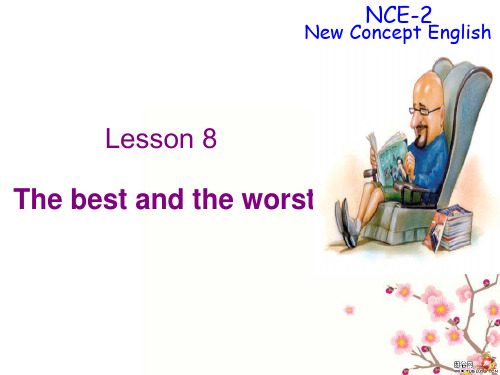
形容词比较级的用法 1. 两者比较时用形容词比较级,其结构为“... 比较级 + than ...”。如:Actions speak louder than words. 2. 在两者之间选择“哪一个更……”时,用句型 “Which / Who is +比较级, ... or ...?”。 如: Which sweater is cheaper, the red one or the yellow one?
ቤተ መጻሕፍቲ ባይዱ
competition neat path wooden pool
Why is Joe's garden the most beautiful one in the town?
Joe Sanders has the most beautiful garden in our town. Nearly everybody enters for "The Nicest Garden Competition" each year, but Joe wins every time. Bill Frith's garden is larger than Joe's. Bill works harder than Joe and grows more flowers and vegetables, but Joe's garden is more interesting.He has made neat paths and has built a wooden bridge over a pool. I like gardens too, but I do not like hard work. Every year I enter for the garden competition too, and I aways win a little prize for the worst garden in the town!
新东方新概念英语第二册课后习题答案详解
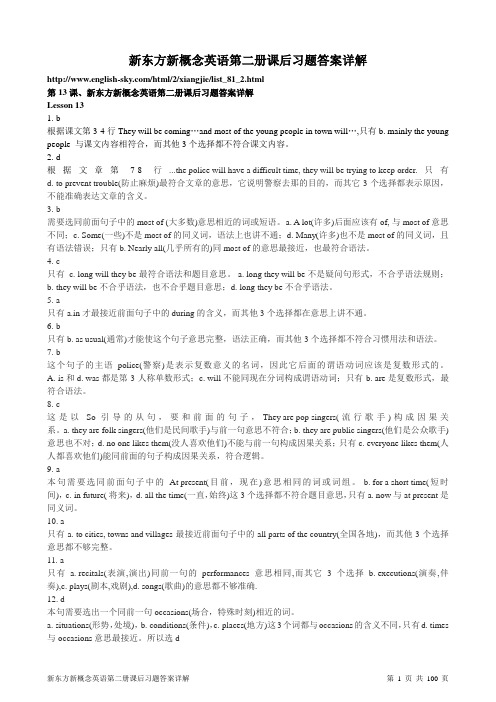
新东方新概念英语第二册课后习题答案详解/html/2/xiangjie/list_81_2.html第13课、新东方新概念英语第二册课后习题答案详解Lesson 131. b根据课文第3-4行They will be coming…and most of the young people in town will…,只有b. mainly the young people 与课文内容相符合,而其他3个选择都不符合课文内容。
2. d根据文章第7-8行...the police will have a difficult time, they will be trying to keep order.只有d. to prevent trouble(防止麻烦)最符合文章的意思,它说明警察去那的目的,而其它3个选择都表示原因,不能准确表达文章的含义。
3. b需要选同前面句子中的most of (大多数)意思相近的词或短语。
a. A lot(许多)后面应该有of, 与most of 意思不同;c. Some(一些)不是most of 的同义词,语法上也讲不通;d. Many(许多)也不是most of 的同义词,且有语法错误;只有b. Nearly all(几乎所有的)同most of 的意思最接近,也最符合语法。
4. c只有 c. long will they be 最符合语法和题目意思。
a. long they will be 不是疑问句形式,不合乎语法规则;b. they will be 不合乎语法,也不合乎题目意思;d. long they be 不合乎语法。
5. a只有a.in才最接近前面句子中的 during 的含义,而其他3个选择都在意思上讲不通。
6. b只有b. as usual(通常)才能使这个句子意思完整,语法正确,而其他3个选择都不符合习惯用法和语法。
7. b这个句子的主语police(警察)是表示复数意义的名词,因此它后面的谓语动词应该是复数形式的。
新概念英语第二册II-64练习详解,导读,课文词语,笔记
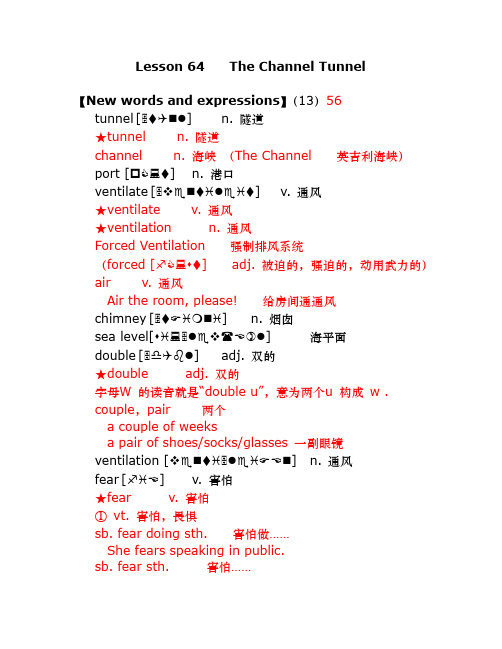
Lesson 64 The Channel Tunnel【New words and expressions】(13)56tunnel[ ♦✈⏹●] n. 隧道★tunnel n. 隧道channel n. 海峡(The Channel 英吉利海峡)port [☐♦] n. 港口ventilate[ ♏⏹♦♓●♏♓♦] v. 通风★ventilate v. 通风★ventilation n. 通风Forced Ventilation 强制排风系统(forced [♐♦♦] adj. 被迫的,强迫的,动用武力的)air v. 通风Air the room, please! 给房间通通风chimney[ ♦☞♓❍⏹♓] n. 烟囱sea level[♦♓●♏☎☜✆●] 海平面double[ ♎✈♌●] adj. 双的★double adj. 双的字母W 的读音就是“double u”,意为两个u 构成w .couple,pair 两个a couple of weeksa pair of shoes/socks/glasses 一副眼镜ventilation [ ♏⏹♦♓●♏♓☞☜⏹] n. 通风fear[♐♓☜] v. 害怕★fear v. 害怕①vt. 害怕,畏惧sb. fear doing sth. 害怕做……She fears speaking in public.sb. fear sth. 害怕……I feared darkness.be afraid of 害怕……I am afraid of dogs.be afraid of / fear 人做主语②vt. 恐怕,猜想(比be afraid要正式)fear that… 恐怕……We fear /It is feared/ We‟re afraid that many lives have been lost in the crash.be afraid that… = I am sorry. 恐怕……(婉言谢绝)Can you help me?I am afraid I can't. = I am afraid not.fright / frighten / frightening / frightened / frightfulsth. frighten sb. = sth. scare sb. ……吓了……一跳You frightened/scared me.The doy frightened me.frighten = scare是因某件突然的事情才让某人产生了害怕的情绪,句子后边的部分是人horrify [ ♒❒♓♐♋♓] v. 使恐怖, 使极度厌恶, 惊骇horrified [♊♒❒✋♐♋✋♎] adj. 惊悸的, 带有恐怖感的, 惊骇的invasion[♓⏹♏♓✞☜⏹] n. 入侵,侵略★invasion n. 入侵, 侵略invade [♓⏹♏♓♎] vt. 侵略, 侵袭, 拥挤officially[☜♐✋☞☜●✋ ☎✍✆ ♐] adv. 正式地★officially adv. 正式地official adj. (官方的)正式formally adv. (一般的)正式connect [ ☜⏹♏♦] v. 连接★connect v. 连接connect sth. with/to… 把……和……连接connect A with B (A和B平等)connect A to B (A连到B上去)This road connects the village with/to London.European [ ◆☜❒☜☐♓☎✆☜⏹] adj. 欧洲的★European adj. 欧洲的continent [ ⏹♦♓⏹☜⏹♦] n. 大陆★continent n. 大陆European Continent 欧洲大陆(不包括欧洲岛国)【Text】In 1858, a French engineer, Aime Thome de Gamond,arrived in England with a plan for a twenty-one-miletunnel under the English Channel. He said that it would be possible to build a platform in the centre of theChannel. This platform would serve as a port and arailway station. The tunnel would be well-ventilated iftall chimneys were built above sea level. In 1860, a better plan was put forward by an Englishman, WilliamLow. He suggested that a double railway-tunnel shouldbe built. This would solve the problem of ventilation, forif a train entered this tunnel, it would draw in fresh airbehind it. Forty-two years later a tunnel was actually begun. If, at the time, the British had not feared invasion, it would have been completed. The world had to wait almost another 100 years for the Channel Tunnel. It was officially opened on March 7,1994, finally connecting Britain to the European continent.参考译文1858年, 一位名叫埃梅·托梅·德·干蒙的法国工程师带着建造一条长21英里、穿越英吉利海峡的隧道计划到了英国. 他说, 可以在隧道中央建造一座平台, 这座平台将用作码头和火车站. 如果再建些伸出海面的高大的烟囱状通风管, 隧道就具备了良好的通风条件. 1860年, 一位名叫威廉·洛的英国人提出了一项更好的计划. 他提议建一条双轨隧道, 这样就解决了通风问题. 因为如果有一列火车开进隧道, 它就把新鲜空气随之抽进了隧道. 42年以后, 隧道实际已经开始建了. 如果不是因为那时英国人害怕入侵, 隧道早已建成了. 世界不得不再等将近100年才看到海峡隧道竣工. 它于1994年3月7日正式开通, 将英国与欧洲大陆连到了一起.【课文讲解】[00:13.9-00:27.1]In 1858, a French engineer, Aime Thome de Gamond, arrived in England with a plan for a twenty-one-mile tunnel under the English Channel.1858年, 一位名叫埃梅·托梅·德·干蒙的法国工程师带着建造一条长21英里、穿越英吉利海峡的隧道计划到了英国.plan for +名词/动名词……的计划twenty-one-mile 加连字符,用单数,作定语[00:27.1-00:33.2] He said that it would be possible to build a platform in the centre of the Channel.他说, 可以在隧道中央建造一座平台,[00:33.2-00:38.8]This platform would serve as a port and a railway station.这座平台将用作码头和火车站.serve as… =serve for… 起……作用,用作……,充当……It will serve as a swimming pool.This sofa can serve as/for (a) bed.[00:38.8-00:45.4]The tunnel would be well-ventilated if tall chimneys were built above sea level.如果再建些伸出海面的高大的烟囱状通风管, 隧道就具备了良好的通风条件.[00:45.4-00:53.1] In 1860, a better plan was put forward by an Englishman, William Low.1860年, 一位名叫威廉·洛的英国人提出了一项更好的计划.put forward (plan/suggestion) 提出(计划、建议等)You know they wouldn‟t accept your plan. Why did you put it forward?[00:53.1-00:58.0]He suggested that a double railway-tunnel should be built.他提议建一条双轨隧道,suggest①vt. 暗示,用法与其他的词相同②vt. 建议,用虚拟语气,后接动词是要用-ing形式,后接that从句采用一种固定的用法“should+动词原形”(should 可省略)I suggested (that) he (should) go home. (that, should 都可省略)He suggested that I should go with him. 他建议我一定要跟他去.insist作“坚持”讲时用法同suggestHe insisted that I should stay to lunch. 他坚持要我留下来吃晚饭.[00:58.0-01:08.0]This would solve the problem of ventilation, for if a train entered this tunnel, it would draw in fresh airbehind it.这样就解决了通风问题. 因为如果有一列火车开进隧道, 它就把新鲜空气随之抽进了隧道.draw in 吸进,如用bring没有draw in 形象、贴切[01:08.0-01:13.1] Forty-two years later a tunnel was actually begun.42年以后, 隧道实际已经开始建了.[01:13.1-01:21.4] If, at the time, the British had not feared invasion, it would have been completed.如果不是因为那时英国人害怕入侵, 隧道早已建成了.虚拟语气(非真实条件句)中,与现在事实相反,从句用一般过去时;与过去事实相反,从句用过去完成时,此时主句格式为would have done,would/could/should 都可以情态动词加have done 表示对过去的推测,如must have done,can't have done等[01:21.4-01:27.8]The world had to wait almost another 100 years for the Channel Tunnel.世界不得不再等将近100年才看到海峡隧道竣工.wait for sb.wait (for) some timesI have waited five minutes. (for 可不要)I have waited for you (for) five minutes.I have waited five years for you.[01:27.8-01:37.8]It was officially opened on March 7,1994, finally connecting Britain to the European continent.它于1994年3月7日正式开通, 将英国与欧洲大陆连到了一起.【Summary writing】1 Who planned to build a tunnel under the EnglishChannel in 1858? How would it be ventilated? (Thetunnel, which…)4 Did work begin forty-two years later or not? Why was it stopped? (Though…because)5 When was the Channel Tunnel officially opened?(However)1 先行词, which : 非限定性定语从句The tunnel, which a French engineer planned to buildin 1858, would be ventilated if tall chimmeys were built above sea level.4 Though it was begun (work begin forty-two yearslater), it was stopped because…5 However 起了副词的作用,后面可以直接加一个句子【Composition】1 The English Channel separates Britain from Europe. The country has not been invaded since1066. (Thanks to…which)2 Modern warfare is far more complex. Such fears no longer exist.(However, now that…)3 Britain benefits enormously from a Channel Tunnel. Europe benefits enormously from a Channel Tunnel. (Both…and)1 thanks to 幸亏(to是介词)Thanks to the English Channel which separates British from Europe, the…2 now that 即使;既然Howwever, now that moden warfare is far morecomplex ,such fears no longer exist.即使现代战争越来越复杂了,然而这样的害怕都已经不存在了3 Both Britain and Europe benefit... (注意benefit不能加s)benefit [ ] n. 利益,好处;vt. 有益于,有助于;vi. 受益【Key structures】第3类条件句第3类条件句是在if从句里设想纯粹想像的事情,在主句里讲述想像的结果,谈的是没有或永远不可能有的结果,指的是过去没有过的事情。
新概念英语第二册:第84课课文详解及语法解析

新概念英语第二册:第84课课文详解及语法解析课文详注 Further notes on the text1.go on strike,罢工。
on strike表示“在罢工”:The workers are on strike.工人们在罢工。
It is not clear yet when the teachers on strike will return to theirclassrooms.当前还不清楚罢课的教师何时会回到教室去。
Must we go on strike?我们必须罢工吗?2.The strike is due to begin on Tuesday. 罢工定于星期二开始。
due表示“预定的”、“约定的”,后面能够跟带to的不定式,也能够不跟。
它后面通常有确定的时间状语:The plane is due(to arrive)in London at 9 o'clock.飞机预定9点抵达伦敦。
The performance is due to begin at 7 o'clock in the evening.演出定于晚上7点开始。
due to后面若是名词,则它表示“因为”、“因为”(通常用于系动词be之后):Our delay was due to the heavy traffic.我们被耽搁了是因为交通拥挤。
3.…the strike will continue until general agreement is reached about payand working conditions.……此次罢工将一直持续到就工资和工作条件问题达成全面协议的时候为止。
在until引导的时间状语从句中,主语agreement的定语about pay and workingconditions被谓语隔开了。
因为谓语很短,如果定语紧跟agreement,则句子读起来会头重脚轻。
新概念英语第二册:第88课课文详解及语法解析
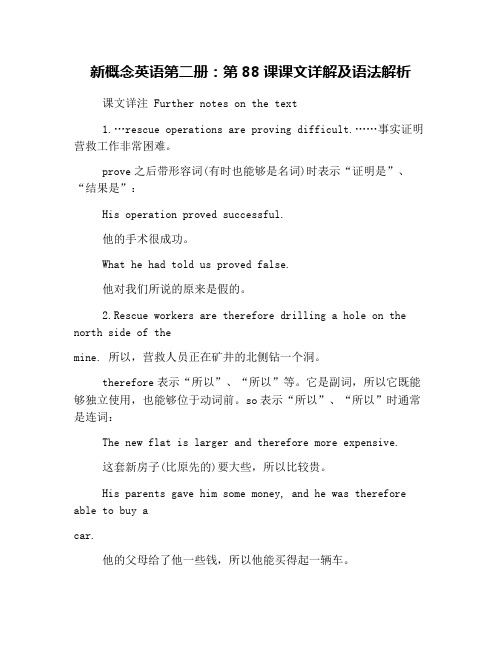
新概念英语第二册:第88课课文详解及语法解析课文详注 Further notes on the text1.…rescue operations are proving difficult.……事实证明营救工作非常困难。
prove之后带形容词(有时也能够是名词)时表示“证明是”、“结果是”:His operation proved successful.他的手术很成功。
What he had told us proved false.他对我们所说的原来是假的。
2.Rescue workers are therefore drilling a hole on the north side of themine. 所以,营救人员正在矿井的北侧钻一个洞。
therefore表示“所以”、“所以”等。
它是副词,所以它既能够独立使用,也能够位于动词前。
so表示“所以”、“所以”时通常是连词:The new flat is larger and therefore more expensive.这套新房子(比原先的)要大些,所以比较贵。
His parents gave him some money, and he was therefore able to buy acar.他的父母给了他一些钱,所以他能买得起一辆车。
His parents gave him some money, therefore, he was ableto buy a car.(译文同上,therefore前后都能够有逗号,so后面通常不用逗号)We arrived early, so we got good seats.我到得早,所以我们找到了好座位。
(so表示“所以”、“所以”时不放在动词前)3.If there had not been a hard layer of rock beneath the soil, they wouldhave completed the job in a few hours.如果不是因为土壤下面有一层坚硬的岩石,他们的营救工作仅用几小时就能够完成了。
新概念英语第二册第八课课文详解

Lesson 8 The best and the worst 的和最差的 ⼀、单词 1、competition n. ⽐赛,竞赛 与它有类似意义的还有match, game, race这些词。
下⾯我们来把这些词对⽐⼀下。
词汇 competition 主要指智⼒与脑⼒的⼀些竞赛,强调对抗性 match 主要指⼩型⽐赛 game 主要指球类运动 race 主要指速度类的竞赛,⽐如说car race等。
compete v. 竞争 compete against/ with 与…竞争 2、neat adj. 整齐的,整洁的 neat=tidy 3、pool n. ⽔池 ⼈⼯的 swimming pool pond 天然的 good pond 4、path n. ⼩路,⼩径 同义词:street/ road (扩展) ⼤家可能还记得"abroad 国外的"这个单词,就可以巧记为:国外的AB⼤街。
5、wooden adj. ⽊头的 e.g.: I want to built a wooden house. 我想建⼀个⽊制的房⼦。
⼆、词组 1.enter for 报名参加 扩展:⼤家要注意区分好这⼏个词: 扩展词汇⽐较 enter 进⼊ join ⼀般指加⼊到⼀些团体组织 attend 多指出席⼀些正式场合(⽐如会议之类) take part in 参加⼀些常规的⽐赛或者活动 2. over 越过,超过。
同时over还有强调"跨过两端的⼀个距离"的意思。
扩展:这⾥有⼀个⼝诀来帮助⼤家记住over介词的⽤法 over under 正上下 above below则不然 3、I do not like hard work. hard work ⾟勤劳动 与 hard work 相关的例句 1.Hard work does wonders. . 苦功能创造奇迹。
2. Hard work produces success. ⾟勤劳动带来成功。
新概念英语第二册:1-3课课文详解及语法解析
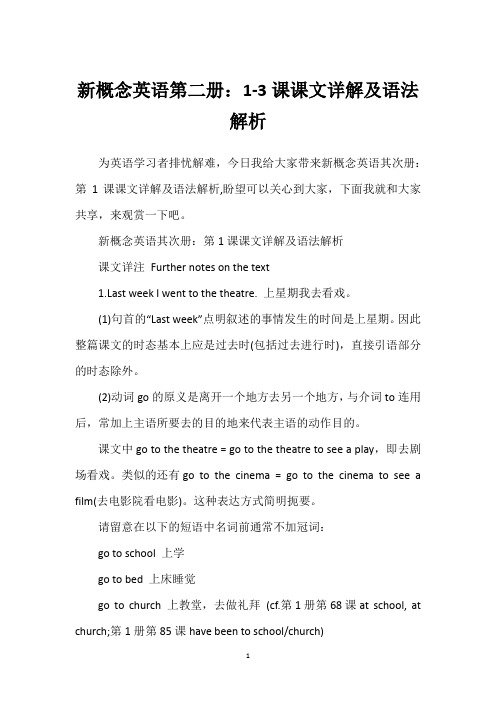
新概念英语第二册:1-3课课文详解及语法解析为英语学习者排忧解难,今日我给大家带来新概念英语其次册:第1课课文详解及语法解析,盼望可以关心到大家,下面我就和大家共享,来观赏一下吧。
新概念英语其次册:第1课课文详解及语法解析课文详注Further notes on the textst week I went to the theatre. 上星期我去看戏。
(1)句首的“Last week”点明叙述的事情发生的时间是上星期。
因此整篇课文的时态基本上应是过去时(包括过去进行时),直接引语部分的时态除外。
(2)动词go的原义是离开一个地方去另一个地方,与介词to连用后,常加上主语所要去的目的地来代表主语的动作目的。
课文中go to the theatre = go to the theatre to see a play,即去剧场看戏。
类似的还有go to the cinema = go to the cinema to see a film(去电影院看电影)。
这种表达方式简明扼要。
请留意在以下的短语中名词前通常不加冠词:go to school 上学go to bed 上床睡觉go to church 上教堂,去做礼拜(cf.第1册第68课at school, at church;第1册第85课have been to school/church)2.had a very good seat 座位很好seat一般指戏院、汽车等配置的固定座位,也可以抽象地表示“座位”或“位子”的概念:the front seat of a car 汽车的前座Take a seat, please. 请坐。
3.The play was very interesting. 戏很有意思。
interesting属于现在分词形式的形容词,意思是“使人感爱好”。
它通常与非人称主语连用或修饰某个事物:This is an interesting book/idea.这是一本好玩的书/一个令人感爱好的办法。
- 1、下载文档前请自行甄别文档内容的完整性,平台不提供额外的编辑、内容补充、找答案等附加服务。
- 2、"仅部分预览"的文档,不可在线预览部分如存在完整性等问题,可反馈申请退款(可完整预览的文档不适用该条件!)。
- 3、如文档侵犯您的权益,请联系客服反馈,我们会尽快为您处理(人工客服工作时间:9:00-18:30)。
新概念英语第二册:第8课课文详解及语法解析
课文详注 Further notes on the text
1.Nearly everybody enters for 'The Nicest Garden Competition' each year, but Joe wins every time. 几乎每个人都参加每年举办的“花园竞赛”,而每次都是乔获胜。
(1)nearly和almost 意义相似,表示“几乎”、“差不多”、“差点儿”的意思:
I'm nearly/ almost ready.
我快准备好了。
I have nearly forgotten his name.
我差点把他的名字忘了。
He nearly missed the train.
他差点没赶上火车。
(2)each和every均可译为“每一个”,二者常常可以互相代替使用:
Every/ Each time I wash the car it rains.
每次我擦洗汽车,天总是下雨。
但是each更强调个体。
它常用以指一个确定的并通常是有限的数目:
Each child in the school was questioned.
学校里的每个孩子都被询问过了。
every却不那么强调个体,常用来指一个大的、不确定的数目:
Every child enjoys Christmas.
所有的/每个孩子都喜欢过圣诞节。
另外,each既可以作形容词又可以作代词,但every只能作形容词:
They each have a share.
他们每人都有一份。
Each of us has his own work to do.
我们每个人都有自己的工作要干。
2.Bill Frith's garden is larger than Joe's. 比尔·弗里斯的花园比乔的花园大。
名词加-'s表示所属关系,构成名词的所有格。
这类名词往往指有生命的东西,特别是人。
所有格的语法作用相当于形容词,限定后面的名词。
这个被限定的名词在上下文中第二次被提到时可以省略,只要不引起误解:
This is Mary's boy friend, not Jane's.
这是玛丽的男朋友,不是简的。
My pen is lost. This one is my brother's.
我的钢笔丢了。
这枝是我兄弟的。
John's handwriting is better than Mary's and Catherine's.
约翰的书法比玛丽的和凯瑟琳的都要好。
3.He has made neat paths and has built a wooden bridge over a pool. 他修筑了一条条整洁的小路,并在一个池塘上架了一座小木桥。
make和build在这里是同义词,都可以解释为“修建”、“建造”。
与汉语的写作习惯一样,用英语写作时同一段文字中尤其是在同一句话中应尽量避免使用重复的词,以使文章显得生动(特殊的修辞手法例外)。
make和build之间的区别主要是:make的词义比较笼统、广泛,可以解释为“做”、“作出”、“制造”等,而build的意义主要限于建筑业,指“建造”、“建设”、“盖房子”、“修筑(桥梁等)”:
They have built a new house.
他们盖了一座新房子。
They have made a road along the river.
他们沿这条河筑了一条路。
Have you made the skirt by yourself?
这裙子是你自己做的吗?
语法 Grammar in use
形容词和副词的比较级和级
在英语中形容词和副词一般可以有比较级和级。
比较级相当于汉语中“比……更……”这种句型,级则表示在某个范围“最……”的概念。
级在使用时前面通常要加定冠词the,并有一个短语或从句限定其范围。
(1)比较级和级的构成
a、单音节词和少数双音节词(如以辅音+-y结尾的词)在词尾加-er, -est,以辅音+-y结尾的词要先将-y变成-i,再在词尾加上-er, -est:
hard--harder--hardest
young--younger--youngest
clean--cleaner--cleanest
busy----busier----busiest
b、以-e结尾的词加-r和-st:
large--larger--largest
nice--nicer--nicest
c、以一个辅音字母结尾的单音节词要双写最后一个字母,然后再加-er, -est:
big--bigger--biggest
thin--thinner--thinnest
d、有一些双音节词在构成比较级和级形式时,既可以在单词结尾处加-er和-est,也
可与more/ less和most/ least连用。
如narrow, clever, common, pleasant 等。
但如无把握时,双音节词用more和most则较为可靠。
两个音节以上的单词如下:
interesting--more interesting--most interesting
e、有些形容词和副词的比较级和级的构成并不规则:
good/ well--better--best
bad/ ill--worse--worst
many/ much--more--most
little--less--least
old--older/ older--oldest/ eldest
far--farther/ further--farthest/ furthest
(2)在使用比较级时,如果需要把所比较的两项都提到,那么就必须在比较级后用than:
I know him better than you do.
我比你了解他。
Jane's hair is darker than Mary's.
简的头发比玛丽的黑。
My room is cleaner than the one next door.
我的房间比隔壁房间干净。
如果比较级之所指很清楚,它可独立存在:
This pen is cheaper.
这支笔更便宜。
This kind of candy is more delicious.
这种糖果更好吃。
(3)级的限定范围一般用of, among, in等介词短语:John is the tallest of the three brothers.
这3个兄弟中约翰个子。
This is the coldest day in ten years.
这是10年来最冷的一天。
限定范围也可以是从句:
Mary is the most intelligent person I've ever met.
玛丽是我所遇到的最聪明的人。
如果范围很清楚,则可以省略:
April is the best season.
4月是的季节。
(暗含范围“一年中”)
He is always the best.
他总是秀的。
(暗含范围“在我们当中”)。
